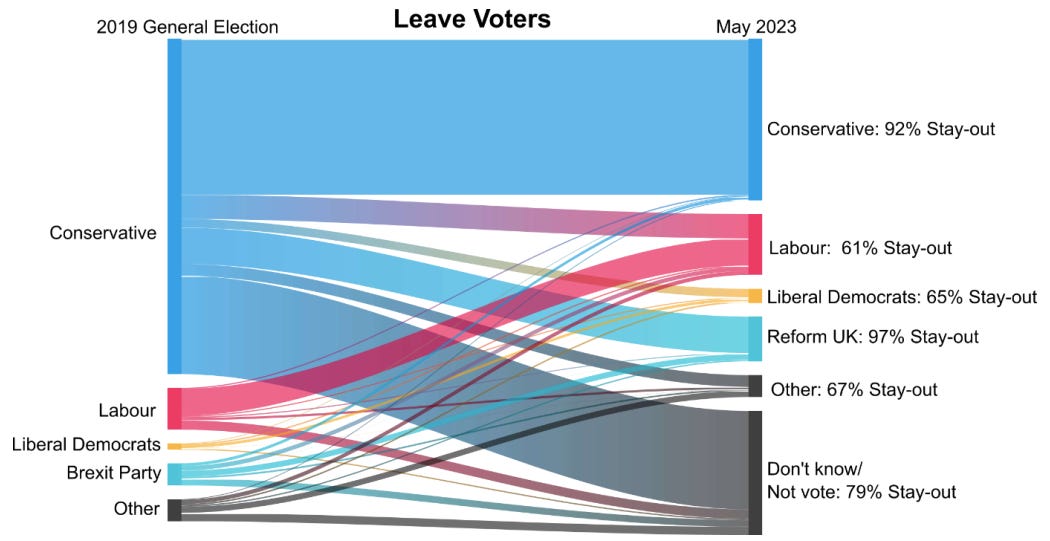How the Tory vote imploded
A deep dive into the collapse of British conservatism
Matt Goodwin’s Substack goes to more than 57,100 subscribers from 167 countries around the world and thousands of paying supporters who support our work. Like our stuff? Then help us expand by becoming a paid supporter and access everything —the full archive, Live with Matt every Friday, exclusive posts, polling, leave comments, join the debate, get discounts, notice about events, and the knowledge you’re supporting independent writers who are pushing back against the grain. Join us on YouTube, Instagram, TikTok, Twitter/X and Facebook.
The Conservative Party’s vote has imploded.
Since the party’s emphatic victory at the last election, in 2019, its support in the national polls has crashed from 44% to, this week, an average of just 26%.
As I said this week, the party is in deep trouble. Were current polling numbers replicated at the looming election –with the opposition Labour Party on 43.5% and the Tories on 26%- the result would be a commanding Labour majority of 202 seats.
The Tories would be reduced to just 144 seats -their worst showing since 1906.
Election night would be filled with one remarkable scene after another, with a constant stream of famous, frontline Tories losing their seats.
Iain Duncan Smith, Damian Green, Steve Baker, Grant Shapps, Jacob Rees-Mogg, Liam Fox, Penny Mordaunt, Robert Jenrick, Robert Halfon, to name just a few, gone.
The Tories would lose just over 200 seats to Labour, around 20 to the Liberal Democrats and, in what I suspect will be one of the major stories at the election, will have to watch Labour make extensive gains north of the border, capturing around 20-25 seats from the SNP.
They would also suffer the humiliation of having to watch every single seat in the Red Wall return to Labour, symbolising how the Tories failed to lean into the post-Brexit realignment of British politics.
Lee Anderson, Jake Berry, Miriam Cates, Ben Bradley, Jonathan Gullis, and Esther McVey, among others, would lose their seats. All those politicians who emerged to speak for a different kind of national conservatism would be gone in an instant.
Which raises the obvious question. Why? Why is the Tory vote imploding? What’s going on beneath the surface? And who, exactly, is abandoning the party?
Well, drawing on the very latest polling and analysis of the British Election Study we can see exactly why.
It’s a fascinating story that tells us a great deal not only about what is likely to happen at the election but the future of British conservatism, too.
In recent weeks, it’s become popular to say the Tories are being hit on two flanks at the same time – by a more organised and professional Labour party, and by the renegade and more radical Reform party.
If you look at what’s happened to the Conservative’s 2019 vote, to all the people who backed Boris Johnson and the party at the last election, then the party is certainly haemorrhaging support on both these fronts.
About 10-15% of 2019 Tories --mainly younger, anti-Brexit voters who didn’t like Boris, especially after Partygate, and are disillusioned with how the Tories are managing the economy—have defected to Labour.
And, at the same time, about 15% of 2019 Tories –who are mainly older, pro-Brexit, and disillusioned with how the Tories are managing immigration and the small boats—are defecting instead to the Reform party.
The fact the Reform party --even without Nigel Farage at the helm-- is attracting one in ten voters nationally and, once you exclude the undecided, one in five disillusioned 2019 Tories should be ringing very loud alarm bells in Number 10.
As I said this week, if somebody gave Reform serious money, if Farage returned as leader, and if he avoided the mistakes of his last general election campaign, in 2015, by surrounding himself with a larger number of high-quality campaigners and analysts then Reform could, easily in my view, enter the 15-20% range.
And that would mainly hurt the Tories.
For every one disillusioned Labour voter and Liberal Democrat switching to Reform there are five disillusioned Tories who have switched to them, too.
Much like their UKIP and Brexit Party predecessors, these defectors tend to be older, non-graduate, working-class and from the non-London regions, though as always there will always be outliers.

What we also know is that these defections are not just being driven by specific issues —like the state of the national economy and immigration.
As the British Election Study team have shown, many of the defections —whether to Labour or Reform— are now being driven by a more diffuse sense out there in the country that the Tories are simply no longer a competent party.
That on the most critical issues facing Britain today –the state of the economy, the cost-of-living crisis, the NHS, the small boats, the level of immigration—the Tories have done a ‘bad job’. Such is this ‘crisis of competence’ that Labour now lead the Conservatives even on issues such as Brexit and immigration.
But, at the same time, the narrative that the Tories are being hit on two fronts is not quite right. Why? Because they’re actually being hit on three.
This is a detailed post with links to evidence for paid subscribers only. Upgrade for all content and join 22,400 others ahead of the biggest election year for some time.



